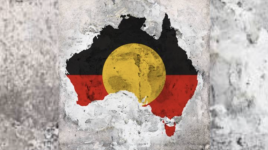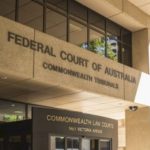Government Seeks to Undermine High Court Ruling that First Nations People Cannot be Deported

The High Court ruled in 2020 that First Nations peoples cannot be deported on character grounds. It specifically found that New Zealand-born Gunggarri man Brendan Thoms and PNG-born Gamilaraay man Daniel Love couldn’t be turfed out of the country, despite minister Dutton’s protestations.
This Kafkaesque scenario, which saw the settler colonial state trying to evict colonised First Peoples came to a head because the Coalition government has gone hog-wild deporting people ever since our current PM and then immigration minister Scott Morrison tightened migration laws in late 2014.
The Love-Thoms ruling determined a new class of people “non-citizen non-aliens”, or Indigenous people who don’t hold Australian citizenship and reside here.
Indeed, the idea that un-deportable residents exist made then attorney general Christian Porter shudder in his all-too-wholesome boots.
But the Morrison government now wants to challenge the Love-Thoms ruling in regard to a recent Federal Court decision that prevented NZ-born Māori-Australian man Shayne Montgomery from being deported on character grounds because he’s become part of the Mununjali nation.
The government is contesting this as the Love decision rested upon the indigeneity tripartite test developed in the 1992 Mabo ruling, which it states Montgomery doesn’t pass, and further, it posits that the Love ruling has bestowed too great a political sovereignty upon First Nations.
Sovereignty never ceded
“As a First Nations mother, I am appalled,” said Megan Krakouer in relation to the attempt to deport Love and Thoms, as well as the fact that ten other First Nations “noncitizens”, who were saved from being exiled by the High Court decision, could now be facing deportation once more.
“We are the heirs of at least 60,000 years of uninterrupted heritage and lineage and connectedness to this continent,” the Mineng woman continued. “No court or tribunal has the right to any adverse say over our heritage, lineage and connectedness.”
Krakouer’s currently running for the Senate in the upcoming election on the Social Justice Independents ticket, alongside Gerry Georgatos.
The SJI team has specifically been calling out the Morrison government’s character test deportation regime as its seen 1,000 people – often long-term residents – banished from the country annually since 2015.
Morrison oversaw the 2014 amending of section 501 of the Migration Act 1958 (Cth), so noncitizens are automatically deported if sentenced to 12 months prison. This includes multiple stints for minor offences, suspended sentences and residential drug rehabilitation or mental illness programs.
“The character test must be abolished and no post-carceral sentence be furthered with any form of potential punishment,” Krakouer told Sydney Criminal Lawyers. “While the Montgomery case differs to Love and Thoms, no one must ever be deported. Australia is their home, citizen or resident.”
First Nations naturalised
Born in New Zealand in 1981 to a Māori father and an Australian mother, Montgomery moved here in 1997. He was sentenced to 14 months in prison in 2018 for robbery. And a few months later, minister Dutton cancelled his visa, and on release, he was placed in immigration detention.
Montgomery went on to challenge this in the Federal Court, claiming he does not classify as a noncitizen, under section 189 of the Migration Act, as he is a Mununjali man, having been adopted by that nation, which, under its laws, does not require biological ancestry to be a part of it.
Yet, this is no mere claim. It’s supported by documented evidence that outlines at 17 he was adopted by a Mununjali family and was living culturally with them and within the community. He’d accessed Aboriginal services with his family. And three affidavits from elders support this.
Federal Court Justice Sarah Derrington outlined last November that “in relation to Mr Montgomery’s Aboriginality”, minister Dutton had failed to consider “the strength of his ties to the community”, and, therefore, the Love determination hadn’t been properly considered.
The justice further ruled that as the decision to cancel his visa was not made in accordance with the law, the matter should be returned to the minister for redetermination, and she ordered Montgomery be released from immigration detention.
The government is now appealing this decision in the High Court. It claims Montgomery is not a First Nations man as he doesn’t adhere to the Mabo tripartite indigeneity test, which firstly requires biological descent, as well as recognition from the individual and Indigenous authorities.
Too much political sovereignty
“Upon the Crown acquiring sovereignty over Australia, Aboriginal persons were legally entitled only to ‘such rights and privileges and subject to such liabilities as the common law and applicable statutes provided’”, asserts the immigrations minister’s submission to the High Court.
“They did not retain any residual sovereignty over the territory of Australia,” it continues, under the section of the document titled Love Should Be Overruled.
The argument the government will make in court is that the Love decision appears to have conferred implicit political sovereignty on Aboriginal societies, because it allows some people to become members of the Australian body politic based on being recognised by Aboriginal society.
The submission then goes on to assert this is problematic as it could lead to a situation where people are accorded membership to Australian society on flimsy grounds who may otherwise be ineligible. And more to the point, the government wouldn’t be able to turf them out.
However, this argument has no real relation to the case at hand, as Montgomery is a man who has legitimately become part of the Mununjali community, living with them and adhering to their cultural ways. He’s not some blow in.
And neither are the over 140,000 migrants who became Australian citizens over 2020-21. However, many of these Australians would have less direct cultural ties to our local society than Montgomery has with Mununjali society.
So, in essence, it seems the crux of the matter is the Morrison government wants to continue to deny Aboriginal sovereignty over stolen land, along with revoking any political power the Love decision may have bestowed upon First Nations.
“As a non-practicing lawyer, I am disgusted by our nation’s legal morass,” Krakouer declared. “Montgomery not being biologically First Nations, reflects that everyone is at risk of deportation, under the Australian-bred argument.”
“The petty but destructive biases of individuals who score their way into our parliaments and translate their biases into policies, such as the ramped-up deportations of people – First Nations and long-term residents – is abhorrent,” the SJI Senate candidate concluded.







